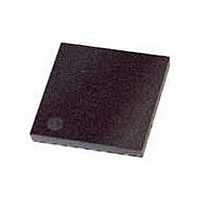ATTINY26-16MQ Atmel, ATTINY26-16MQ Datasheet - Page 4

ATTINY26-16MQ
Manufacturer Part Number
ATTINY26-16MQ
Description
Microcontrollers (MCU) AVR 2K FLASH 128B EE 128B SRAM ADC
Manufacturer
Atmel
Datasheet
1.ATTINY26-16MQ.pdf
(19 pages)
Specifications of ATTINY26-16MQ
Processor Series
ATTINY2x
Core
AVR8
Data Bus Width
8 bit
Program Memory Type
Flash
Program Memory Size
2 KB
Data Ram Size
128 B
Interface Type
2-Wire, ISP, SM-Bus, SPI, UART, USI
Maximum Clock Frequency
16 MHz
Number Of Programmable I/os
16
Number Of Timers
2
Maximum Operating Temperature
+ 85 C
Mounting Style
SMD/SMT
Package / Case
MLF-32
3rd Party Development Tools
EWAVR, EWAVR-BL
Development Tools By Supplier
ATAVRDRAGON, ATSTK500, ATSTK600, ATAVRISP2, ATAVRONEKIT
Minimum Operating Temperature
- 40 C
On-chip Adc
10 bit, 11 Channel
Lead Free Status / Rohs Status
Details
2.2
2.2.1
2.2.2
2.2.3
2.2.4
2.2.5
4
Pin Descriptions
ATtiny261/461/861
VCC
GND
AVCC
AGND
Port A (PA7..PA0)
The AVR core combines a rich instruction set with 32 general purpose working registers. All the
32 registers are directly connected to the Arithmetic Logic Unit (ALU), allowing two independent
registers to be accessed in one single instruction executed in one clock cycle. The resulting
architecture is more code efficient while achieving throughputs up to ten times faster than con-
ventional CISC microcontrollers.
The ATtiny261/461/861 provides the following features: 2/4/8K byte of In-System Programmable
Flash, 128/256/512 bytes EEPROM, 128/256/512 bytes SRAM, 6 general purpose I/O lines, 32
general purpose working registers, one 8-bit Timer/Counter with compare modes, one 8-bit high
speed Timer/Counter, Universal Serial Interface, Internal and External Interrupts, a 4-channel,
10-bit ADC, a programmable Watchdog Timer with internal Oscillator, and three software select-
able power saving modes. The Idle mode stops the CPU while allowing the SRAM,
Timer/Counter, ADC, Analog Comparator, and Interrupt system to continue functioning. The
Power-down mode saves the register contents, disabling all chip functions until the next Inter-
rupt or Hardware Reset. The ADC Noise Reduction mode stops the CPU and all I/O modules
except ADC, to minimize switching noise during ADC conversions.
The device is manufactured using Atmel’s high density non-volatile memory technology. The
On-chip ISP Flash allows the Program memory to be re-programmed In-System through an SPI
serial interface, by a conventional non-volatile memory programmer or by an On-chip boot code
running on the AVR core.
The ATtiny261/461/861 AVR is supported with a full suite of program and system development
tools including: C Compilers, Macro Assemblers, Program Debugger/Simulators, In-Circuit Emu-
lators, and Evaluation kits.
Supply voltage.
Ground.
Analog supply voltage.
Analog ground.
Port A is an 8-bit bi-directional I/O port with internal pull-up resistors (selected for each bit). The
Port A output buffers have symmetrical drive characteristics with both high sink and source
capability. As inputs, Port A pins that are externally pulled low will source current if the pull-up
resistors are activated. The Port A pins are tri-stated when a reset condition becomes active,
even if the clock is not running.
Port A also serves the functions of various special features of the ATtiny261/461/861 as listed
on
page
65.
2588BS–AVR–11/06
















